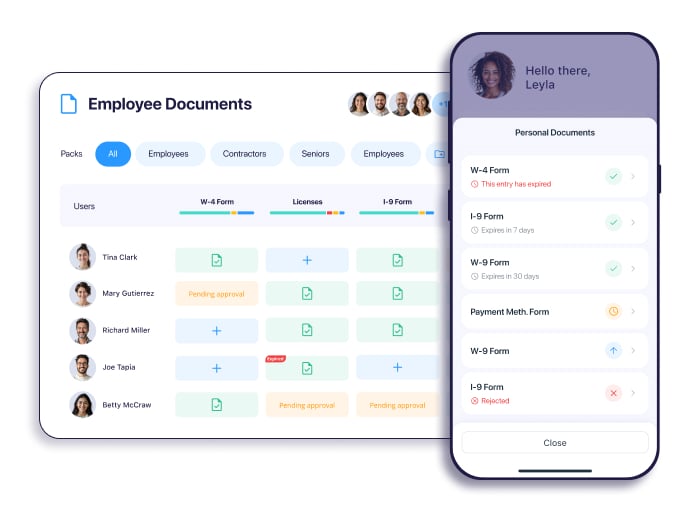Many construction businesses miss out on extra revenue and a larger customer base by not providing additional construction services.
You can offer these services as the basis of your brand-new construction company, or add them to established businesses to provide even more value to your customers.
But which services should you provide?
In this guide, I’ll share 15 of the best additional construction services you can provide to grow your business.
Key Takeaways
- Some of the top construction services to add include remodeling services, painting, landscaping, waterproofing, and installing flooring, windows, doors, or fences.
- In addition to the construction upsell ideas themselves, focus on their viability and complexity to ensure they’re right for your business and local market.
- When choosing additional construction services to offer, you should understand market demand, calculate costs, and select services that complement your core offering.
Top Construction Service Add-Ons
Whether you’re just starting a construction business or looking to expand, below are some of the top add-on services you can offer.
Important note: Because direct data isn’t always available, I cross-referenced multiple resources to find estimated cost ranges. The exact costs depend on the scale of your operation, marketing, and the equipment, vehicles, licenses, and staff you already have.
Did You Know?
As you expand into more services, scheduling and dispatching can get complicated. Connecteam’s scheduling features let you assign the right workers to each job, handle last-minute changes, and keep everyone updated instantly.
Remodeling and renovation services
Remodeling and renovating consist of updating, upgrading, or otherwise changing existing spaces in a property.
Upsell opportunities: Typical projects include bathrooms, kitchens, living rooms, bedrooms, and basements.
Market viability: Demand for remodeling is strong. People often change their minds about property design, or want to upgrade their properties according to new trends or to boost property value.
Startup complexity: Moderate. It requires proper permits, skilled labor, tools, and materials that you may not have. Startup costs range from $10,000–$500,000.
Interior and exterior painting services
This service is simple: You paint the inside or outside of a property.
Upsell opportunities: You can offer anything from painting a single room to refreshing a customer’s entire property.
Market viability: Painting is a viable service since people frequently want to change the appearance of their properties. Also, repainting is necessary as walls get scuffed and damaged over time.
Startup complexity: Low. However, depending on the jobs you take and the state you’re in, additional licensing may be required. Startup costs range from a few hundred dollars to multiple thousands of dollars.
Flooring installation and repair
This involves installing new flooring for customers or repairing existing floors.
Upsell opportunities: You can specialize in various flooring types, including laminate, hardwood, carpet, cork, tile, linoleum, or stone.
Market viability: There’s plenty of demand for flooring services. New trends are always emerging, motivating people to switch to more durable, aesthetic, and sustainable flooring options. There are also many older homes and commercial buildings that need flooring upgrades.
Startup complexity: Moderate to high. It requires skilled labor, tools and materials, licensing, and insurance. Startup costs range from $15,000–$50,000.
4 Heating, ventilation, and air conditioning (HVAC) installation and maintenance
This service is straightforward: You install and maintain customers’ HVAC systems.
Upsell opportunities: You can cover air conditioners, ductwork, furnaces, vents, thermostats, compressors, and coils.
Market viability: “HVAC work tends to generate the best upsell opportunities because of ongoing maintenance contracts and high demand,” real estate contractor and consultant Ron Tavakkoli tells Connecteam.
The demand makes sense: People want to keep their properties at a comfortable temperature year-round. Also, as new and more efficient models get released, many people upgrade their HVAC systems to save on utilities and be more environmentally friendly.
Startup complexity: Moderate. You may need an HVAC license, tools and equipment, properly trained staff, and insurance. Startup costs range from around $2,000–$12,000 on the low end, but can rise to $100,000 on the high end.
Did You Know?
You can use Connecteam to store staff documents (including HVAC licenses and certificates) in one place, giving you a clear view of each employee’s documents and when they expire.
This same feature works for any licensed or certified work—Connecteam keeps all your staff’s credentials organized and sends alerts before anything expires.

5 Smart home and automation installation
This service involves installing home automation and smart home features for customers.
Upsell opportunities: Popular installations include smart thermostats, automated lights, smart security systems, and appliances with networking capabilities.
Market viability: There’s strong demand for this service because an increasing number of people are interested in automating certain aspects of their home. Smart home technologies also generally become cheaper as technology advances, which encourages more people to make the switch.
Startup complexity: Moderate. It may require technical skills, an understanding of various technologies, licenses, and tools. Startup costs range from around $15,000 to hundreds of thousands of dollars.
Energy-efficiency and green building solutions
These services focus on using green designs, materials, and strategies when building or maintaining a home or commercial building.
Upsell opportunities: Options range from energy-efficient windows to recycled materials and renewable energy systems.
Market viability: With businesses and homeowners prioritizing sustainability and efficiency, few types of construction businesses are as in-demand as those that use green and environmentally-friendly practices.
Startup complexity: High. It requires specific expertise, pricy materials and equipment, permits and licenses, regulatory knowledge, and a deep knowledge of green technologies, solutions, and strategies. Startup costs range from a few hundred thousand dollars to over a million dollars.
Mold remediation and environmental cleanup
With this service, you contain and remove mold or other dangerous substances in people’s homes, commercial buildings, or other locations.
Upsell opportunities: This service may also involve repairing damage caused by mold or other hazardous materials.
Market viability: Demand for mold remediation is high since mold is very common, especially in moisture-collecting areas like basements and bathrooms. Disasters, leaks, and other events are also common, which may lead to hazardous substances entering people’s homes. Many people aren’t suited to remediate on their own, either.
Startup complexity: Moderate. It’s a specialized construction service, so you’ll need proper tools, equipment, safety gear, permits, licenses, and an understanding of important regulations. Startup costs range from $20,000–$1 million.
Waterproofing and basement finishing
These services involve preventing water damage and ensuring basements stay dry, and transforming unfinished basements into usable and livable spaces.
Upsell opportunities: Services often include sealing cracks, applying waterproof membranes, and improving drainage.
Market viability: There’s high demand for these services, given that water damage and basement flooding issues are common. Also, many families want to turn unfinished or unsightly basements into spaces they’re excited to spend time in.
Did You Know?
98% of basements experience water damage in some capacity, highlighting the importance of waterproofing services.
Startup complexity: Moderate. You need to be familiar with specific tools and moisture prevention techniques, have knowledge about different materials, and possess the necessary permits, insurance, and licenses. Plus, you’ll require skilled laborers. Startup costs begin at roughly $2,000 and can reach over $400,000.
Pro Tip
A lot goes into waterproofing and finishing a basement, so make sure your team uses a construction checklist to ensure nothing gets missed.
Siding and exterior cladding
This involves installing and maintaining the protective outer layers of buildings.
Upsell opportunities: You might work with vinyl, wood, brick, stone, or metal for varying degrees of protection.
Market viability: Siding and exterior cladding services are highly viable. This is because building exteriors are exposed to harsh weather conditions (including strong winds, hail, snow, rain, intense sunlight, and other threats) that can cause damage. In most cases, this damage requires professional repair.
Startup complexity: Moderate. It may require knowledge of proper installation techniques, weatherproofing and moisture control, dealing with various materials, and adhering to building codes. Startup costs range from $2,000–$10,000.
Landscaping and hardscaping
These services are for improving the outdoor areas in residential and commercial spaces.
Upsell opportunities: Enhancements may include patios, walkways, retaining walls, plants, or water features.
Market viability: Landscaping and hardscaping will always be in demand. People and businesses alike are continually looking to improve outdoor spaces to make them more visually appealing and functional.
Startup complexity: Moderate. While some landscaping companies are basic, offering these services often requires a high initial investment for equipment, tools, and machinery, strategic planning, skilled workers, knowledge of plants and/or soil, as well as education on landscaping design principles. Startup costs range from $5,000–$50,000.
Deck and patio construction
With this service, you build decks and patios for homes and businesses.
Upsell opportunities: Designs can include wood, stone, concrete, and polyvinyl chloride (PVC). You can provide various designs and style options, as well as built-in storage, sun protection, railings, or privacy screens.
Market viability: Deck and patio construction services are highly viable, as people often seek to enhance the appearance and functionality of their outdoor spaces.
Startup complexity: High. Companies need to consider materials, be skilled in design, adhere to codes, and maintain structural integrity while ensuring the decks and patios look good. Startup costs range from $10,000–$50,000.
This Might Interest You
With how important protecting your business is when taking on big jobs like deck construction, take time to learn more about construction insurance in our detailed guide.
Concrete staining and decorative finishes
These services turn plain concrete into a beautiful flooring surface.
Upsell opportunities: You can use various types of stains, coatings, patterns, and colors to change the look of traditional concrete flooring.
Market viability: These services are in high demand, as concrete flooring is low maintenance and durable but doesn’t look great. Staining and decoratively finishing concrete maintains its durability and quality and drastically improves its look.
Startup complexity: Moderate. It doesn’t involve much machinery or tools, but it does require precision, artistic talent, knowledge of different finishes/stain types, and the ability to prepare surfaces properly. To start a full construction business, costs range from $11,000–$20,000. For staining only, we can estimate $5,000–$10,000 in costs.
Window and door installation
This involves installing new doors and windows in residential buildings, office buildings, stores, and other properties.
Upsell opportunities: You can offer customers a wide range of sizes, shapes, and materials for both windows and doors.
Market viability: There’s very strong demand here, as nearly every building has doors and windows. Over time, doors and windows can become damaged or worn out, requiring the installation of new ones. Many older buildings still have poorly-insulated windows and doors, too.
Startup complexity: Moderate. You’ll need an inventory of doors and windows, skilled workers, necessary equipment and tools, proper vehicles and protective materials to transport the windows and doors, and the proper licenses and permits. Startup costs range from $10,000–$200,000+.
Fence installation and repair
This service is another straightforward one: You are installing new fencing for homes and businesses, or you repair existing fences.
Upsell opportunities: Your fences can be built from wood, steel, PVC, chain link, or composite, and you can offer decorative elements, annual inspections, or even integrated mailboxes to provide additional value.
Market viability: Solid demand. Fences are necessary for many properties, and they may degrade over time due to the elements, which requires them to be fixed or replaced.
Startup complexity: Moderate. It requires planning, skilled labor, materials, tools, and equipment. Plus, you need knowledge of local regulations and the ability to deal with varied terrain, in-ground utilities, and many other concerns. Startup costs range from $10,000–$30,000.
Specialty carpentry
This is a specialized construction service that involves more than just basic carpentry. It focuses on unique, difficult, and precise designs.
Upsell opportunities: You can offer services like custom cabinetry, decorative woodworking, unique built-ins, integrated furniture, and personalized designs.
Market viability: While specialty carpentry is a niche construction trade, there’s still plenty of demand for beautiful wooden products or features.
Startup complexity: Moderate. You need the proper tools and equipment to create the pieces and skilled carpenters to craft them. Plus, you have to source the required materials and need the time and patience to get all the details right. Startup costs range from $1,500–$25,000.
This Might Interest You
Successfully managing an expanding construction business is challenging, so check out our detailed guide on running a construction business to learn useful tips.
How to Choose Additional Construction Services to Grow Your Business
When you’re considering construction services to offer, here are some important considerations to make:
- Evaluate the demand: Julian Barak, owner of Vesta Builders, tells Connecteam that “it’s all about the demand” when it comes to picking services. “If clients keep asking about a specific service and you see a pattern, that’s the first signal it might be worth adding,” he adds.
Pro Tip
Use Connecteam’s free GPS-enabled time clock to track employee hours by project. You’ll know exactly how much labor each add-on service costs and can price jobs with confidence.
- Know the cost: After you look at demand, Barak recommends considering the cost. He specifies, “I look at what it would cost to deliver, what I could sell it for, and whether the margin makes sense.” You should crunch the numbers to ensure the service is profitable for you, considering both startup costs and any ongoing expenses or fees.
- Complement your core offering: Select add-ons that are closely related to the types of construction services you already offer. As Adam Babin, CEO and Managing Director of Restoration 1, tells Connecteam, “Finding a service that will either complement your core service or that will require the lowest barrier of entry to move into that new service offering will be the biggest driving force in decision-making.”
FAQs
What does “construction services” mean?
Construction services are a broad term that refers to the duties and tasks related to building, repairing, or upgrading structures or properties. Some of these may be niche construction services, while others are very general in nature.
What are the six types of construction?
The six types of construction are residential, commercial, institutional, mixed-use, industrial, and heavy civil.
What do I do before offering new construction services?
Before offering additional construction services, you may need to train your staff, purchase new equipment, secure additional permits and licenses, and obtain the proper insurance.
Disclaimer
This article is for general informational and educational purposes only. It is not intended as and does not constitute business, financial, or professional advice, and should not be relied upon as such. Market conditions and business outcomes can vary widely. Before pursuing new services or business strategies, consult with a qualified business advisor for tailored advice based on your business’s circumstances. Connecteam accepts no responsibility for consequences arising from actions taken or not taken based on the information present in this article.


